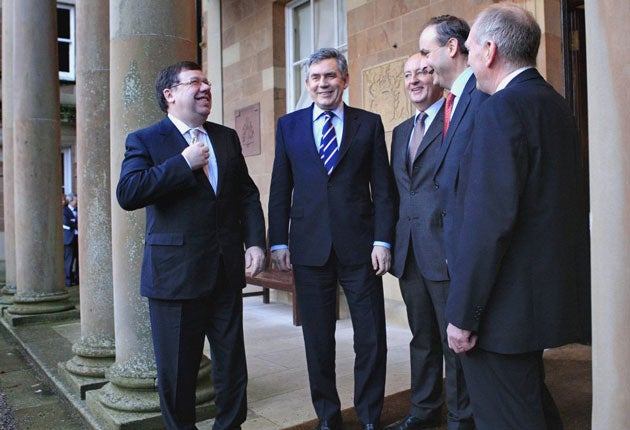Transfer of policing and justice powers confirmed

Your support helps us to tell the story
From reproductive rights to climate change to Big Tech, The Independent is on the ground when the story is developing. Whether it's investigating the financials of Elon Musk's pro-Trump PAC or producing our latest documentary, 'The A Word', which shines a light on the American women fighting for reproductive rights, we know how important it is to parse out the facts from the messaging.
At such a critical moment in US history, we need reporters on the ground. Your donation allows us to keep sending journalists to speak to both sides of the story.
The Independent is trusted by Americans across the entire political spectrum. And unlike many other quality news outlets, we choose not to lock Americans out of our reporting and analysis with paywalls. We believe quality journalism should be available to everyone, paid for by those who can afford it.
Your support makes all the difference.Prime Minister Gordon Brown and Taoiseach Brian Cowen were today launching a deal to save Northern Ireland's power-sharing government - confirming it will take on policing and justice powers from April 12.
The deal between the Democratic Unionist Party and Sinn Fein includes new plans on overseeing parades.
The deal comes after nearly two weeks of round-the-clock negotiations and brings an end to fears that the power-sharing government could have collapsed on the policing, justice and parades stand-off.
A six-member working group is to be established to deal with controversial loyal order parades.
Its work will begin immediately and will be completed within three weeks.
The deal envisages local people providing local solutions which respect the rights of those who parade as well as nationalist residents.
Mr Brown praised the settlement.
He said: "The achievements have been as great as they are inspirational.
"This moment and this agreement belongs to the people of Northern Ireland, all of the people, and now more than ever before so does their future."
Mr Brown said: "This is the last chapter of a long and troubled story and the beginning of a new chapter after decades of violence, years of talks, weeks of stalemate."
He predicted that the settlement would help build a lasting peace.
Northern Ireland First Minister Peter Robinson welcomed the deal and said: "There are some who will play politics with this agreement but the real focus in the months to come must be on building an administration at Stormont that our whole community identifies with and supports."
Deputy First Minister Martin McGuinness said that as an Irish republican he wanted to see a united Ireland but recognised that unionists preferred to maintain links with Britain.
He insisted both communities could and should live together in mutual respect.
"We need to make life better for our children and grandchildren," he said.
"That is what this agreement must mean in practice."
Mr Cowen said today's deal laid the foundations for a new future.
He said: "That better future must be built on mutual respect for people of different traditions, equality and tolerance and respect for each other's political aspirations and cultural expressions and inheritance."
Join our commenting forum
Join thought-provoking conversations, follow other Independent readers and see their replies
Comments